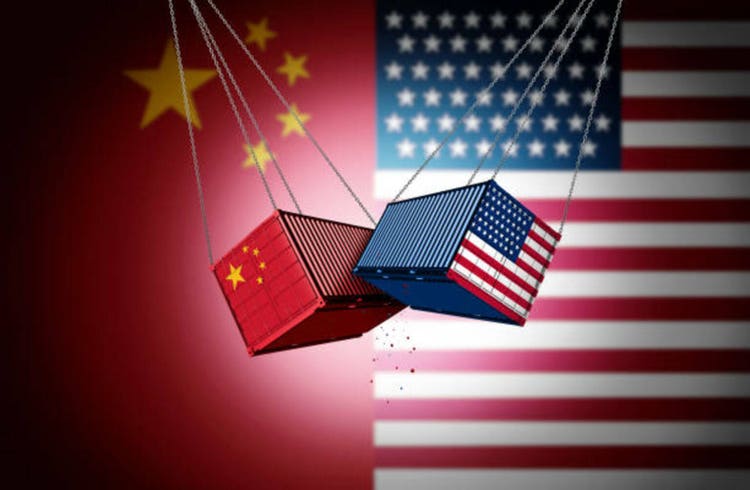Business
Trump Threatens Trade War Escalation Over Cooking Oil Imports

U.S. President Donald Trump has signaled a potential escalation in the ongoing trade tensions with China, specifically targeting imports of cooking oil. In a post shared on social media on September 26, 2023, Trump accused China of deliberately rejecting U.S. soybeans, which has prompted discussions about halting cooking oil imports from the country.
The President’s remarks come amid a backdrop of strained relations between the United States and China. The U.S. Department of Agriculture has reported a significant decline in soybean exports to China, which traditionally has been one of the largest consumers of American soybeans. This development raises concerns for U.S. farmers who rely heavily on exports to sustain their businesses.
Trump’s post suggests that the U.S. could retaliate against China’s actions by limiting the import of cooking oils, which are often derived from soybeans. The potential policy shift underscores the administration’s commitment to address perceived unfair trade practices by China. “I believe that China is purposefully not buying our soybeans,” Trump stated in his post, indicating a firm stance against what he views as economic manipulation.
The repercussions of such a move could be substantial, affecting both domestic markets and international trade relationships. Farmers and agricultural economists are closely monitoring the situation, as disruptions in trade could lead to further volatility in commodity prices.
China’s refusal to purchase U.S. soybeans has been attributed to several factors, including the ongoing trade war and the availability of alternative sources. As the world’s largest importer of soybeans, China’s decisions significantly impact global supply chains and pricing structures in agricultural markets.
Trump’s administration has previously implemented tariffs on various Chinese goods, which has led to retaliatory measures from Beijing. The latest comments from the President indicate that the trade conflict could intensify if the current situation continues. Analysts are weighing the potential impact on both economies as negotiations remain stagnant.
The agricultural sector is particularly vulnerable to changes in trade policies, and any decisions regarding cooking oil imports will likely have immediate effects on U.S. farmers and consumers alike. Stakeholders are advocating for a resolution to restore trade flows and stabilize market conditions.
As this situation unfolds, it will be essential to monitor how both the U.S. administration and China respond to these developments. The outcome of this trade dispute could have long-lasting implications for international relations and global agricultural markets.
-

 Education3 months ago
Education3 months agoBrandon University’s Failed $5 Million Project Sparks Oversight Review
-

 Science4 months ago
Science4 months agoMicrosoft Confirms U.S. Law Overrules Canadian Data Sovereignty
-

 Lifestyle3 months ago
Lifestyle3 months agoWinnipeg Celebrates Culinary Creativity During Le Burger Week 2025
-

 Health4 months ago
Health4 months agoMontreal’s Groupe Marcelle Leads Canadian Cosmetic Industry Growth
-

 Science4 months ago
Science4 months agoTech Innovator Amandipp Singh Transforms Hiring for Disabled
-

 Technology3 months ago
Technology3 months agoDragon Ball: Sparking! Zero Launching on Switch and Switch 2 This November
-

 Education3 months ago
Education3 months agoRed River College Launches New Programs to Address Industry Needs
-

 Technology4 months ago
Technology4 months agoGoogle Pixel 10 Pro Fold Specs Unveiled Ahead of Launch
-

 Business3 months ago
Business3 months agoRocket Lab Reports Strong Q2 2025 Revenue Growth and Future Plans
-

 Technology2 months ago
Technology2 months agoDiscord Faces Serious Security Breach Affecting Millions
-

 Education3 months ago
Education3 months agoAlberta Teachers’ Strike: Potential Impacts on Students and Families
-

 Science3 months ago
Science3 months agoChina’s Wukong Spacesuit Sets New Standard for AI in Space
-

 Education3 months ago
Education3 months agoNew SĆIȺNEW̱ SṮEȽIṮḴEȽ Elementary Opens in Langford for 2025/2026 Year
-

 Technology4 months ago
Technology4 months agoWorld of Warcraft Players Buzz Over 19-Quest Bee Challenge
-

 Business4 months ago
Business4 months agoNew Estimates Reveal ChatGPT-5 Energy Use Could Soar
-

 Business3 months ago
Business3 months agoDawson City Residents Rally Around Buy Canadian Movement
-

 Technology2 months ago
Technology2 months agoHuawei MatePad 12X Redefines Tablet Experience for Professionals
-

 Business3 months ago
Business3 months agoBNA Brewing to Open New Bowling Alley in Downtown Penticton
-

 Technology4 months ago
Technology4 months agoFuture Entertainment Launches DDoD with Gameplay Trailer Showcase
-

 Technology4 months ago
Technology4 months agoGlobal Launch of Ragnarok M: Classic Set for September 3, 2025
-

 Technology4 months ago
Technology4 months agoInnovative 140W GaN Travel Adapter Combines Power and Convenience
-

 Science4 months ago
Science4 months agoXi Labs Innovates with New AI Operating System Set for 2025 Launch
-

 Technology4 months ago
Technology4 months agoNew IDR01 Smart Ring Offers Advanced Sports Tracking for $169
-

 Top Stories2 months ago
Top Stories2 months agoBlue Jays Shift José Berríos to Bullpen Ahead of Playoffs










